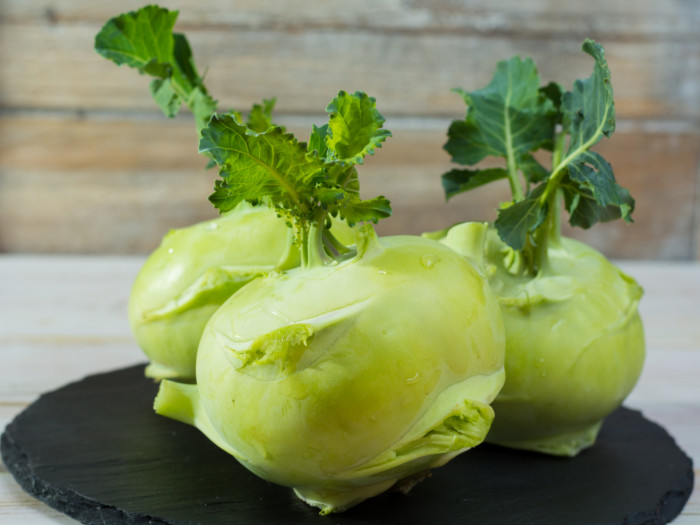Kohlrabi is a hardy, annual vegetable that is primarily consumed in European countries, although in recent years it has also become a vegetable staple in northern India. The health benefits of kohlrabi might include its ability to improve the digestive processes, assist in weight loss goals, help boost the immune system, increase circulation, strengthen bones, improve ocular health, and assists in protecting muscle and nerve function.
What is Kohlrabi?
Kohlrabi is actually a cultivar of cabbage and was specifically bred as a hardier version of cruciferous vegetables, which often can’t grow in harsh conditions. The small bulbous vegetable is encased in two harder shells of leaves, which typically do not soften when cooked. Kohlrabi can be eaten raw or cooked and has been a staple of German cuisine for hundreds of years. You can use the kohlrabi root as well as the leaves in your diet, as they both have significant amounts of nutrients. [1]
Kohlrabi tastes somewhat like a broccoli stem, although somewhat more palatable, and is often softer, even taking on the consistency of an apple at times. While the roots/stems are often used in salads in a similar way as carrots or broccoli, the leaves are typically interchanged for kale or spinach. Some countries even use it as food for their livestock, as it is packed with beneficial nutrients and grows relatively easily in certain climates. [2]

Kohlrabi Photo Credit: Shutterstock
Kohlrabi Nutrition Facts
Kohlrabi is so highly-valued in countries and cuisines around the world not only for its diversity in cooking applications but also because it might be full of nutrients and minerals. According to USDA National Nutrient Base, kohlrabi consists of calcium, potassium, magnesium, iron, and calcium, as well as vitamins C, B-complex, A, and K. Along with that, it is also high in dietary fiber and antioxidant compounds such as phytochemicals and various carotenes. [3] [4]
Health Benefits of Kohlrabi
Health benefits of kohlrabi include the following:
May Improve Digestion
Just like most cruciferous vegetables, kohlrabi may be a good source of dietary fiber that can seriously improve digestive health. Fiber helps to move your bowels, reducing constipation, cramping and bloating, and generally improving the quality of your gastrointestinal system, while also maximizing your nutrient uptake efficiency. [5]
May Aid In Weight Loss
In a report published in the Journal Integrative Medicine, researchers called kohlrabi the perfect vegetable for a weight loss diet. Why? It may be low in calories, high in fiber, and packed with beneficial nutrients. Fiber makes us feel full, so even if the volume of food consumed isn’t that great, we are more likely to snack between meals or overeat. [6]
May Boost Energy Level
Kohlrabi may be rich in potassium, and although this characteristic of potassium isn’t discussed too often, it is one of the key players in muscle and nerve behavior in the body. It helps us move, breathe, react, and function every single day. As such, adequate amounts of this mineral–and the high potassium content, as mentioned, in this vegetable may make it a great addition to your diet to keep you alert, energetic, and in great shape! [7]
May Regulate Blood Pressure
Dr. Jiang He of Harvard University revealed in a study that in addition to its impact on energy levels, potassium also functions as a vasodilator, reducing the strain on the cardiovascular system by easing the tension of blood vessels and arteries. This can increase circulation throughout the body, oxygenating key areas, and lowering the risk of cardiovascular events like strokes or heart attacks. Potassium is also a key part of fluid regulation in the body, as it works with sodium to regulate fluid movement between cells. [8]
May Prevent Anemia
Apart from potassium, Kohlrabi may also consist of iron. The significant levels of iron found in kohlrabi go hand-in-hand with the potassium content; iron helps to increase the red blood cells (RBC) in the body, which are essential to prevent anemia (iron deficiency). This deficiency is characterized by weakness, fatigue, headaches, stomach disorders, disorientation, and general immune system failure. The calcium found in kohlrabi may also help improve the uptake of iron by the body, so kohlrabi is an all-round booster for both the immune and cardiovascular systems. [9]
May Improve Bone Strength
As we get older, our bones inevitably weaken, but one of the best ways to avoid or significantly slow down that process is by eating mineral-rich foods. Some of these foods include vegetables like kohlrabi, which may contain high manganese, iron, and calcium content. [10]
May Aid In Eye Care
A 2013 report published in the journal Clinical Interventions in Aging [11]indicates that Kohlrabi may be a rich source of carotenes, including beta-carotene, which acts as an antioxidant compound in the body, particularly in the ocular area. Vitamin A can help to prevent macular degeneration and slow down or eliminate the appearance of cataracts. This is done by neutralizing the free radicals in the eye and preventing oxidative stress.
Word of Caution: Aside from a very rare case of a food allergy, it is not the source of any known allergens and can be eaten without worry by the vast majority of people – especially for those looking for a healthier form of cabbage!
